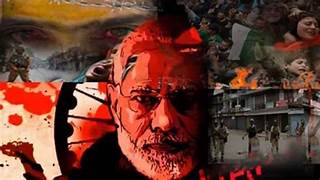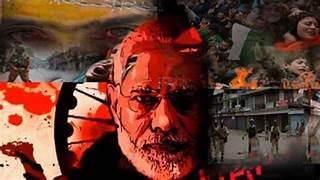Schmittian Moments 3


Narendra Modi’s India represents a distinct and evolving form of Schmittian politics, one where the sovereign logic of decision, the mobilization of a majoritarian identity, and the subordination of liberal-legal neutrality to political theology are all visible, albeit inflected through the institutions and rhetoric of electoral democracy.
Carl Schmitt’s concepts, particularly sovereignty as the power to decide on the exception, the friend-enemy distinction as the essence of the political, and the theological underpinnings of law and order, offer a sharp lens through which to interpret Modi’s reshaping of the Indian state.Under Modi, the Indian state has repeatedly asserted its sovereign prerogative to suspend norms in the name of higher unity or crisis. The 2019 revocation of Article 370, stripping Jammu and Kashmir of its constitutional autonomy, was a paradigmatic Schmittian move: an exceptional decision that bypassed deliberative consensus in favor of centralized command. Similarly, the sweeping 2016 demonetization campaign, an abrupt invalidation of most of the nation’s currency, functioned as an executive rupture of economic and legal norms under the guise of purifying the system. In both cases, the move was not justified by procedural rationality but by moral-political necessity, asserting the sovereign’s right to define the exception.
India’s COVID-19 lockdowns also followed this pattern. Modi implemented one of the harshest and fastest lockdowns in the world, with scant warning, affecting millions of migrant laborers and informal workers. While many democracies acted under emergency powers, Modi’s approach emphasized personal command over deliberative process—echoing Schmitt’s belief that in moments of crisis, true power is revealed not in laws but in who decides.
At the heart of Schmitt’s political theory is the view that politics arises from distinguishing friend from enemy. Modi’s political project has increasingly relied on constructing and naturalising this divide along civilizational and religious lines: Hindu vs. Muslim, nationalist vs. anti-national, insider vs. infiltrator. The Citizenship Amendment Act and the proposed National Register of Citizens embody this logic. They delineate who belongs and who does not, not on the basis of universal legal equality, but on religious identity. The state thus ceases to be neutral and becomes an instrument of identity-based decision, producing political unity through exclusion. The rise in anti-Muslim rhetoric, violence, and state inaction or complicity, combined with the symbolic centrality of Hindu religious practices in state ceremonies, such as the Ram Temple inauguration in Ayodhya led by Modi, signal a collapse of the liberal distinction between secular state and religious identity. In Schmittian terms, this is the return of political theology: the state's legitimacy increasingly rooted in a sacred, civilizational narrative.
Although India remains formally a constitutional democracy, there is growing evidence that law is being hollowed out as a check on power and increasingly used as an instrument of political will. The use of sedition laws, anti-terror legislation such as the UAPA, and the practice of “bulldozer justice” (the demolition of Muslim homes and businesses without due process) reflects a Schmittian attitude toward law, not as an autonomous domain of rights or procedure, but as a tool for reinforcing the sovereign’s conception of order. Courts have often affirmed this sovereign logic by deferring to executive power in matters of national security, religious politics, and dissent. The suppression of journalists, NGOs, and student movements through legal and bureaucratic means exemplifies what Schmitt warned against in liberalism: the illusion of neutrality masking political struggle. In Modi's India claims of liberal neutrality are always considered the sinister deceit of the craven enemy.
Modi has cultivated the role of sovereign not just as a bureaucratic or party functionary but as the embodiment of the nation’s will, its pain, and its aspirations. His rhetorical style, invoking ancient civilizational values, presenting himself as a self-sacrificing servant of the people, and channeling the grievances of the majority, mirrors Schmitt’s idea of a sovereign who transcends institutional normalcy to restore or preserve order. His authority is not technocratic or even purely party-based, it is mythic, built on a personal bond with the people, reminiscent of Schmitt’s idea that the state ultimately rests not on liberal consensus but on decisive political unity forged through shared existential commitments.
Modi’s India is not fascist, nor a totalitarian state in the classical sense, but it increasingly expresses Schmittian political architecture: the erosion of liberal legal neutrality, the deployment of exception to reconfigure the constitutional order, the construction of political identity through exclusion, and the sacralization of sovereign leadership in the face of pluralism and proceduralism. In this context, Schmitt’s warning about liberalism, its tendency to disarm itself by denying the inherently political nature of conflict, seems prophetic. India’s liberal-democratic institutions still exist, but they are being reconfigured under the pressure of a majoritarian political theology that treats pluralism not as a strength but as a threat to national unity. From a Schmittian view, what we are witnessing is not the breakdown of order but its re-foundation on new political-theological grounds, with Modi as its sovereign anchor.